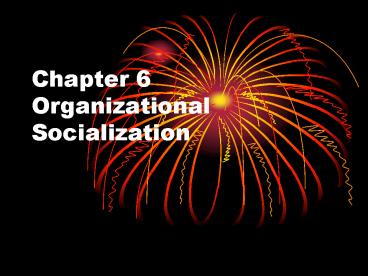Chapter 6 Organizational Socialization PowerPoint PPT Presentation
1 / 13
Title: Chapter 6 Organizational Socialization
1
Chapter 6Organizational Socialization
2
Introduction
Organizational culture and organizational
socialization
OrganizationalCulture(Chapter 4)
OrganizationalSocialization(Chapter 6)
What a newemployee needsto learn.
The process by whicha new employeelearns the
culture.
3
Roles and Role Behavior
- Role activities, duties, responsibilities,
required behaviors - Contributions from the person in exchange for
inducements from the organization (pay, fringe
benefits)Psychological Contract - Must roughly balance for the person to accept the
role
4
Roles and Role Behavior (Cont.)
- Role behavior
- Pivotal role behaviors must accept them to join
and remain a member of an organization - Relevant role behaviors considered desirable and
good by the organization, but not essential to
membership - Peripheral role behaviors neither necessary nor
desirable but tolerated
5
Boundary Transitions
- Socialization process is continuous throughout a
person's association with an organization - Most intense before and after boundary
transitions - Boundary transitions occur when a new employee
crosses the organization's boundary upon joining
the organization
6
Boundary Transitions (Cont.)
- Also occur as the person's career unfolds and she
crosses other boundaries within the same or
different organization - Employee is most susceptible to organizational
influences just before and just after those
transitions
7
Boundary Transitions (Cont.)
- Dimensions
- Functional emphasizes development and use of
skills and abilities in doing a particular task - Hierarchical move upward in organization
(promotion) - Inclusionary emphasizes acceptance of values,
norms, and required behavior. Become part of the
inner circle.
8
Individual and Organizational Perspectives on
Socialization
Person Individualization
Organization Socialization
Socialization Versus Individualization
9
Stages ofOrganizational Socialization
- Three stages of socialization
- Choice Anticipatory socializationbefore joining
the organization - Entry/Encounterafter entering the organization
- Change Metamorphosislate stage featuring a new
selfimage - Result of one stage becomes input to next stage
10
Stages ofOrganizational Socialization (Cont.)
- Individual perspective experiences at each stage
- Management perspective each stage helps the
socialization process achieve its goals - When experienced?
- First job
- New position in same organization
- New position in different organization
11
Stages ofOrganizational Socialization
Choice Anticipatory socialization(Getting in)
Expectations
Entry/encounter(Breaking in)
Reality
Change Metamorphosis(Settling in)
Taking on the role
12
Ethical Issues inOrganizational Socialization
- Several ethical issues center on informed consent
- Should the organization tell potential new
employees that it will try to change some values
and behavior? - Should present employees be told that each time
they change positions, their values and behavior
will also change? - Should an organization reveal the socialization
and training goals of its training programs
before employees enter the programs?
13
Ethical Issues inOrganizational Socialization
(Cont.)
- Debasement experiences
- Most organizations use mild forms of debasement
- Sororities, fraternities, basic military
training, military academies use strong forms of
debasement (historically) - Can create feelings of fear and intimidation
- Debasement experiences pose a clear ethical
dilemma for organizations and managers

